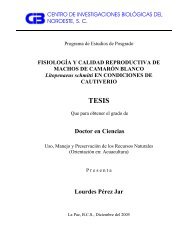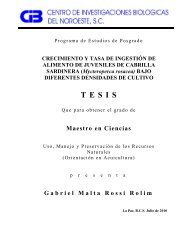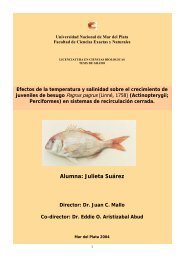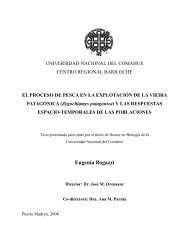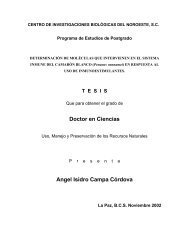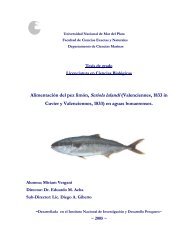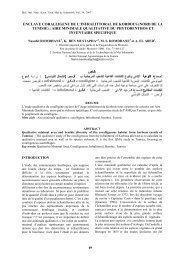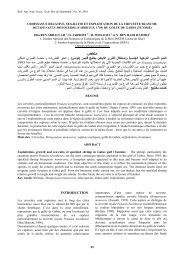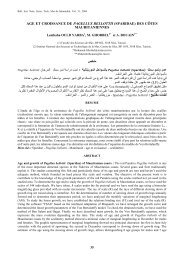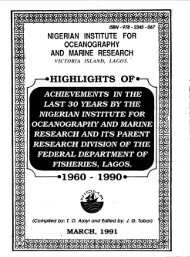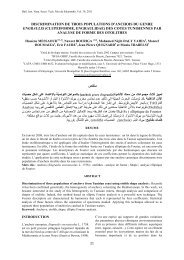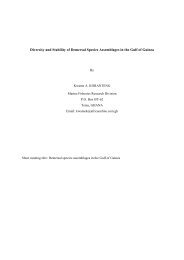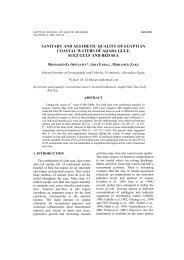Coastal vulnerability, resilience and adaptation to ... - OceanDocs
Coastal vulnerability, resilience and adaptation to ... - OceanDocs
Coastal vulnerability, resilience and adaptation to ... - OceanDocs
You also want an ePaper? Increase the reach of your titles
YUMPU automatically turns print PDFs into web optimized ePapers that Google loves.
conducted with Delft Hydraulics for the Dutch Ministry of Transport, Public Works <strong>and</strong> Water<br />
Management. In distinguishing between morphological, ecological <strong>and</strong> socio-economic <strong>resilience</strong>,<br />
the paper shows the importance of taking an interdisciplinary approach <strong>to</strong> assessing<br />
coastal <strong>vulnerability</strong>, <strong>resilience</strong> <strong>and</strong> <strong>adaptation</strong> <strong>to</strong> climate change.<br />
The third paper (Klein <strong>and</strong> Bateman, 1998) presents the only empirical work in this thesis.<br />
It is an environmental economic analysis of the value of recreation in a coastal freshwater<br />
nature reserve in North Norfolk, United Kingdom. The Norfolk Wildlife Trust used the results<br />
<strong>to</strong> argue against a recommendation in the Shoreline Management Plan for North Norfolk,<br />
which was <strong>to</strong> adapt <strong>to</strong> sea-level rise by implementing a policy of managed retreat. Such a<br />
policy would most likely lead <strong>to</strong> the disappearance of the nature reserve. The Norfolk Wildlife<br />
Trust encouraged the inclusion of the results of the environmental economic analysis in the<br />
cost-benefit analysis on which the recommendation for managed retreat was based.<br />
The fourth paper (Smit et al., 2000) is the only paper in this thesis that does not have a<br />
coastal focus. This paper was prepared <strong>to</strong> provide structure <strong>to</strong> the then emerging academic<br />
<strong>and</strong> policy debate on the desirability, feasibility <strong>and</strong> “assessability” of <strong>adaptation</strong> <strong>to</strong> climate<br />
change. Many of the concepts introduced in this paper, including the need <strong>to</strong> consider natural<br />
climate variability as well as human-induced climate change when defining needs <strong>and</strong> opportunities<br />
for <strong>adaptation</strong>, have been adopted in the IPCC Third Assessment Report.<br />
The process of <strong>adaptation</strong> <strong>and</strong> an approach <strong>to</strong> its assessment are analysed more closely in<br />
the fifth paper in this thesis (Klein et al., 1999). This paper presents coastal management experiences<br />
from The Netherl<strong>and</strong>s, the United Kingdom <strong>and</strong> Japan, which show that <strong>adaptation</strong><br />
<strong>to</strong> natural variability <strong>and</strong> anticipated change is an iterative, cyclical process. Elements in this<br />
cycle are information collection <strong>and</strong> awareness raising, planning <strong>and</strong> design, implementation,<br />
<strong>and</strong> moni<strong>to</strong>ring <strong>and</strong> evaluation. The paper argues that the failure <strong>to</strong> consider all four steps in<br />
<strong>adaptation</strong> assessments has constrained the development of <strong>adaptation</strong> strategies that are<br />
supported by the relevant ac<strong>to</strong>rs <strong>and</strong> integrated in<strong>to</strong> existing management. It introduces the<br />
term “adaptive capacity”, which has become a central focus for linking <strong>adaptation</strong> with development<br />
priorities.<br />
The final paper (Klein et al., 2001) uses the framework developed by Klein et al. (1999)<br />
<strong>to</strong> provide a detailed overview of the types of technologies that are available <strong>to</strong> plan, facilitate<br />
<strong>and</strong> implement <strong>adaptation</strong> in coastal zones. It is based on the coastal <strong>adaptation</strong> chapter<br />
of the IPCC Special Report on Methodological <strong>and</strong> Technological Issues in Technology Transfer<br />
(Klein et al., 2000). This paper again links climate change with climate variability <strong>and</strong> emphasises<br />
the importance of building capacity for technology transfer in developing countries.<br />
The concluding chapter of this thesis presents a synthesis of the six papers in the light of<br />
recent initiatives that build on the conceptual work on <strong>vulnerability</strong>, <strong>resilience</strong> <strong>and</strong> <strong>adaptation</strong>.<br />
It discusses in more detail than the preceding papers the need for <strong>adaptation</strong> in developing<br />
countries <strong>and</strong> the subsequent importance of integrating <strong>adaptation</strong> policy with development<br />
activities. The chapter outlines a number of possible next steps than can be taken <strong>to</strong><br />
advance the academic underst<strong>and</strong>ing of <strong>vulnerability</strong>, <strong>resilience</strong> <strong>and</strong> <strong>adaptation</strong> whilst increasing<br />
the adaptive capacity of developing countries.<br />
6.3. Contribution <strong>to</strong> the papers<br />
The times when great minds could work in isolation on challenging research questions <strong>and</strong><br />
produce meaningful results are long gone. No academic work of quality is possible without extensive<br />
collaboration with other scientists. This is particularly the case for interdisciplinary<br />
research, which explains why all the following six papers are multi-authored. To enable the<br />
Christian-Albrechts-Universität zu Kiel <strong>to</strong> verify whether this PhD thesis contains sufficient<br />
material of quality by the PhD c<strong>and</strong>idate himself, Table 5 gives an overview of his contributions<br />
<strong>to</strong> each of the papers.<br />
25



